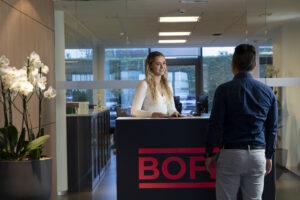The time has come. Since 1 July 2021, the new rules on e-commerce and VAT have come into effect. The new simplification regimes of the OSS system (One Stop Shop) can also be applied and will reduce a lot of the administrative burden. The new regulations are of great importance, not least for web shops.
Below is an overview of the new rules based on the three sub-schemes within the OSS system:
- the Union scheme (OSS EU)
- the non-Union scheme (OSS non-EU)
- the import regime (IOSS)
1. The Union scheme (OSS EU)
The Union scheme will be applicable to the following categories of transactions:
- A. Intra-Community distance sales
- B. Certain services provided by EU companies
- C. Certain supplies via electronic interfaces
A. Intra-Community distance sales (web shops)
Intra-Community distance sales are supplies of goods dispatched or transported by the supplier from one Member State to another Member State, for B2C customers (individuals or members of the ‘gang of 4’).
It is important that the former threshold amounts that applied in the EU (i.e. EUR 35,000 and EUR 100,000) have been completely abolished. In the past, one only had to register in another Member State if these turnover thresholds were exceeded on an annual basis.
Under the new rules, VAT is payable immediately (from the first euro) in the country to which the goods are shipped.
There is one important exception to this: if the annual turnover from all intra-Community distance sales to other Member States and all TBE services (Telecommunications, Radio and Television Broadcasting, and Electronic Services) does not exceed the threshold of EUR 10,000 (excl. VAT), the company can charge VAT of the country from which the goods depart. This is the so-called exception for ‘micro enterprises’. A further requirement for this is that the supplier is only established in one Member State. As a company, however, you can always choose to report VAT in the Member State of arrival of the goods.
B. Certain services provided by EU companies
From now on, the Union scheme can also be applied to services which, for VAT purposes, are located in a Member State other than the Member State where the service provider is established. Previously, it was already possible to pay VAT on TBE services provided to private individuals in other Member States via the ‘MOSS system’.
This scheme is now also being extended to other types of services that, for VAT purposes, must be located in a Member State other than the one of establishment.
This relates, for example, to the following services:
– real estate services (localisation in country of location of real estate)
– passenger transport services (localisation in country where transport takes place, proportionate to distances travelled)
– services related to cultural, artistic, sporting, scientific, educational, entertainment or similar activities, such as trade fairs and exhibitions
– restaurant and catering services (localisation in country where their services are provided)
2. Non-Union scheme (OSS non-EU)
The non-Union scheme is similar to the Union scheme in terms of services that are located in a Member State where the service provider is not established. However, this scheme must be applied by companies established outside the EU which provide such services to non-taxable persons domiciled in a Member State.
Here is an example: A Swiss company carries out renovation work (work on real estate) for private individuals residing in Austria and Germany. Austrian and German VAT is due (location of real estate) by the Swiss company.
The Swiss company has the option of registering in a Member State of its choice under the non-Union scheme within the OSS system to report and pay the locally owed VAT.
In this way, the company avoids the obligation to register separately in each Member State, which is often accompanied by the heavy burden of appointing a fiscal representative.
3. Import regime (IOSS)
The import regime can be applied by companies making distance sales of goods where the goods are transported from a third country to a customer within the EU. These goods are therefore in principle the subject of import into the EU.
As there used to be problems with the import exemption from VAT for ‘small consignments’ (up to 22 euros), this import exemption was abolished. From now on, all imports in the context of distance sales are, in principle, subject to VAT.
In order to limit customs formalities, the import regime was created for consignments with an intrinsic value of no more than 150 euros (excl. VAT). A company can apply the IOSS scheme for such consignments. The scheme does not apply to deliveries of new means of transport, excise goods and deliveries with installation.
Under the application of the IOSS scheme, the import of the goods will be exempt from VAT, but the VAT levy will be shifted to the underlying delivery by the supplier to the customer. The company that is sending a consignment can then communicate its IOSS number to Customs, whereby the import will remain exempt from VAT and no customs formalities need be completed. However, the supplier must charge VAT to the buyer on the delivery. This VAT due is reported and paid via the IOSS number.
Distance sales via electronic interfaces
Under certain circumstances, so-called “electronic interfaces” will be responsible for the payment of VAT on sales made through them. This essentially means the online marketplaces, such as Amazon, Bol.com, and so on. They will be responsible for paying the VAT when a supplier uses their market portal for:
- distance sales of goods made to non-taxable persons from third countries and which are imported into the EU, and where the goods have an intrinsic value of not more than 150 euros
- or the supply of goods (already in free circulation in the EU) to non-taxable persons in the EU, and where the supplier is established outside the EU
Practical
Companies that wish to register under one of the above OSS schemes must do so via the Belgian web application Intervat. You can already submit such a registration request on Intervat from 1 April. This request will normally be processed from 1 July 2021. After registration, it will be possible to submit OSS declarations from 1 July 2021 under any scheme.
Under the Union scheme and the non-Union scheme, the returns are filed on a quarterly basis. The quarterly returns must be submitted before the end of the month following that quarter: April, July, October, January.
Under the Import Regulation, the returns must be submitted on a monthly basis. These must be submitted before the end of the following month.
The VAT due will always have to be paid within the same periods set for the submission of the returns.
Companies will also have to keep accounts in the form of a register with which the content of the OSS declarations can be checked. This register must contain a minimum number of elements. And must also be kept for ten years and can be submitted electronically to the control officials.






